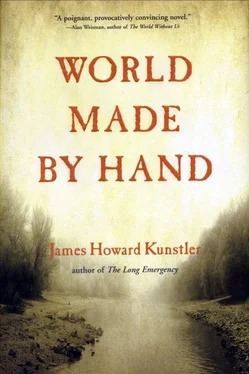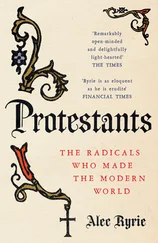I had heard Starkville was particularly hard hit by the Mexican flu. We didn’t know anyone from there, and I wasn’t aware of anyone from our town who carried on trade down there these days. Now I had to wonder if anything was left. Beyond the modest business district, Main Street reverted to old state Route 4. Some of the houses along there were occupied by gaunt, slovenly adults and a few halfnaked children dressed in tatters hanging around the front porches doing nothing. Even the few pigs running in the street seemed mostly skin and bone. No dogs came out to greet us. They had probably succumbed to the roasting spit or the stewpot as life grew harder over the years. The yards were filled with weeds and shrubs. Only here and there had anyone made an attempt to grow potatoes or corn. The inhabitants regarded us suspiciously as we walked our horses by, probably frightened by the well-fed New Faith men in their imposing broad-brimmed hats and the weapons they carried. Brother Minor ventured to banter with these people in his joking way as we walked by, but they did not respond to his gags and most skulked indoors when he spoke at them.
“Sometimes I think I’m a chicken,” he said to one ill-looking old man with his face sunk into his beard, sitting on his porch on a broken-down sofa. “Felt this way ever since I was an egg.” The old fellow just stared hollowly. I was glad to leave the place behind.
South of Starkville, we passed some individual farms that looked like going concerns, not exactly prosperous, but at least as though the owners had not given up. The corn was in and their gardens were laid. But you had to wonder what held them together as a community. Whenever we approached, if there was anybody outside, we’d see them head into their houses at a distance. Possibly they took us for marauders or scavengers, and for all I know they went inside in order to train rifles on us. Along in that stretch we came upon one particular young man, perhaps sixteen, leading a swayback horse pulling a hay wagon. He did not seem afraid of us.
“Are you militia or pickers?” he said.
“Neither,” Brother Joseph said and explained as how we were on a search to Albany.
“They’s all thieves down there,” the boy said. “Got any sugar? You can have a flake of hay each if you spare a little sugar.”
“We don’t have no sugar,” Brother Minor said.
“I’ve got some honey,” I said.
“I don’t have no vessel to carry no honey. I’ll give you all a flake for a spoonful.”
“All right,” I said.
We stopped and made a little trade. The hay was good, sweet timothy grass.
Brother Minor sang to himself as he fed his flake to his mount.
“A swarm of bees in May is worth a load of hay.
A swarm of bees in June is worth a silver spoon.
But a swarm of bees in July isn’t worth a fly.”
The pavements on Route 4 were badly broken, and we walked in line along the shoulder, where the asphalt had worn away altogether and the dirt was beaten soft by hooves. Black-eyed Susans, blue bugloss, chicory, and Queen Anne’s lace bloomed there. Here and there, carcasses of the odd truck and automobile that had not been collected years before in the great drive for metal sat rusting in the flowers. Now and then the road came very close to the river, and we could see through the trees along the bank. We did not see a single sail or an oar craft on the water wherever we were afforded a look.
By the early evening we had gone about twenty miles since leaving home. My hips and rear end hurt from rocking in the saddle. In vivid evening light we came upon a house sited on a barren sweep of scrubby fields on a hill overlooking the river. Thinking it deserted, like many other dwellings along the way, we dismounted to see if we might stay there for the night and make ourselves a meal. Joseph knocked firmly on the door. To our surprise, a woman answered. It was hard to tell her age because she was extremely thin, but I guessed about sixty. I imagined she had been pretty when young. She seemed friendly, unlike the others we’d encountered that day, and welcomed us all inside warmly, and even volunteered right away to cook us supper. Her name was Gladys Raynor, she said, and she was waiting for her husband to return from a journey he had made out to Utica to see about some relatives there. The house was orderly but smelled funny, like rodents had got into the walls and maybe died there. In fact, one would surmise that the Raynors had once been well off. The furniture was good quality, and the paintings on the wall were above the grade of art fair kitsch.
Joseph offered some of our provisions to help her with that supper she had offered to make us, some bacon, meal, butter, onions, but she declined, said she was all set, if we didn’t mind lamb stew with new potatoes, fresh peas, and corn bread. As far as we were concerned, that was sumptuous fare. She said we could turn our horses out in her pasture, which was still well fenced and that we could pitch a camp on any level spot we pleased outside on her property. When we got all that going, we collected out on her spacious back porch, which was furnished with nice wicker and offered a broad view across the Hudson Valley. The sun was lowering in the opposite direction, behind the house, and the few thin clouds hanging in the eastern sky blazed in rosy-golden reflected light. Mrs. Raynor banged around in her kitchen and eventually she came out with a pitcher and some glasses on a tray.
“How are you fellows doing?”
We all said fine, thank you, and offered some vague pleasantries.
“I thought you might want to try some of my strawberry wine.”
We all said thank you. She put the tray down on a round wicker table.
“This used to be a sod farm,” she said. “We had all the sod business between Albany and Glens Falls.”
“Is that so?” Brother Minor said. He managed to refrain from making a joke. Perhaps he sensed, as I did, that something was off.
“Well, there’s not much call for sod these days, as you might imagine,” Mrs. Raynor said with an attempt at a plucky smile. The effort only made her face seem more skull-like. “I’ll go back in and see to supper.”
Brother Seth, no shrinking violet, had a go at the pitcher as soon as she went back inside. The twilight had reached the purple stage where things were no longer very distinct. He filled the five glasses. One by one we all had our sips and soon enough we were all cutting looks about at each other.
“This here’s plain water,” Brother Minor said in a low voice, “or I’m a durn mud turtle.”
“Well, it’s nice clean water, at least,” Elam said, “and sometimes I think you are a mud turtle.”
“Maybe she made a mistake,” Seth said.
“Any of you all see a garden about this place?” Minor said.
“None that I noticed,” Seth said.
“Ssshhhhh,” Joseph said.
We didn’t speculate about it further. We just sat along the porch there in a row watching the last glimmers of daylight dissolve in the shadows of the far hills, enjoying our water. Time went by. We watched a quarter moon swing above the treetops while glimmers of its reflection on the river played through. An owl hooted off in the distance. We slapped at mosquitoes. Our stomachs growled. I didn’t notice any cooking aromas emanating through the screen door.
Finally, Mrs. Raynor called for us to come inside. She had no candles going in there, not even further back in the kitchen. The moon cast a pallid glow through the windows. She directed us into the old formal dining room. It contained a large oval table and padded chairs. I had a candle stub in my pocket and lit it. Elam found a tall crystal candlestick on the sideboard to put it in, while Joseph went out to get more candles from his pannier. The table was set for six with cloth napkins and nice cutlery.
Читать дальше












